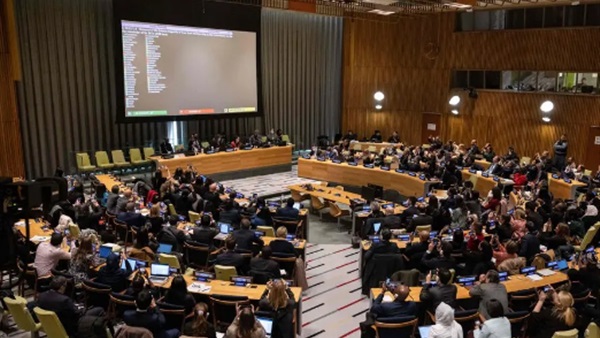Iran Ousted From U.N. Women’s Rights Agency in U.S.-Backed Vote

Iran was kicked out of the United Nations women’s agency on Wednesday in a U.S.-led vote that came months into Tehran’s brutal crackdown on uprisings driven by women and young people who are demanding an end to the Islamic Republic’s rule.
The resolution, backed by 29 members of the U.N. Economic and Social Council, was the strongest symbolic gesture taken so far by the United Nations in response to Iran’s efforts to quell unrest that began after the death in September of a woman being held by the morality police. Iran’s record of discrimination and violence against women were cited as reasons.
The U.S.-backed resolution, co-sponsored by more than a dozen allies, immediately removes Iran for the remainder of its four-year term from the Commission on the Status of Women, a body whose aim is to protect and promote women’s rights around the world.
Linda Thomas-Greenfield, the U.S. ambassador to the United Nations, said in an interview that the action sent a twofold message.
“First is to the government of Iran that we will hold them accountable,” said Ms. Thomas Greenfield. “I think more important is the message it sends to Iranian women. I think it sends a strong message: We are here for you, we’ve got your back, we are going to stand with you.”
The resolution passed 29 to 8, with 16 abstentions, marking the first time a member state had been removed from the U.N. women’s body. Russia, China and some of Iran’s other political and economic allies voted against the resolution, condemning it as politically inspired interference in the domestic affairs of a sovereign nation.
Nationwide protests demanding the end of the Islamic Republic’s rule have convulsed Iran for nearly three months.
The protests were set off by the death of Mahsa Amini, 22, while in the custody of the morality police on allegations that she had violated mandatory hijab rules. Women and young people have since led protests under the slogan “Women, Life, Freedom,” unifying various movements, from labor unions to ethnic groups.
In their speeches, several diplomats invoked the names of Ms. Amini, along with Nika Shakarami and Sarina Esmaeilzadeh, two 16-year-old girls killed through blows to the skull by security forces as they were protesting peacefully.
Rights groups say at least 450 people have been killed, including 50 children and teenagers, and more than 15,000 people have been arrested. Iran executed two young male protesters, one hung from a crane in public, over the past week on charges of “moharebe,” or being an enemy of God, after allegations they killed members of the plainclothes Basij militia.
The executions were widely condemned internationally and domestically, and even by senior religious scholars and clerics, for lacking due judicial process and relying on coerced confessions.
After the U.N. move on Wednesday, Ms. Thomas-Greenfield said, her Twitter page had been flooded with thank-you messages from Iranian women. Before the vote, a group of prominent Iranian women’s rights activists, among them Narges Mohammadi, who is in prison, signed a letter asking the United Nations to remove Iran from the women’s commission.
Amir Saeid Iravani, Iran’s ambassador to the United Nations, told the chamber on Wednesday that the resolution amounted to a “hostile policy” by the United States against the Iranian people and “would be exceedingly dangerous to the U.N. system’s integrity.”
Iran’s election to the 45-member U.N. women’s body was contentious from the start. It gained a four-year seat in March 2022 though a regional quota system, and many argued that its removal contradicted the organization’s principles of multilateral engagement.
But months of reading testimonies and watching videos of security guards violently beating, shooting and killing women and young girls changed the tide. Many countries that abstained from the vote on Wednesday said they remained concerned about Iran’s treatment of women and girls during protests.
In late November, the U.N.’s Human Rights Council voted to create an independent fact-finding mission to investigate and document Iran’s human rights violations. Iranian activists attending that November meeting clapped and cheered and said it was an important milestone for any future legal action.
Iranian women’s rights activists have been fighting for four decades against discriminatory laws related to mandatory dress codes, divorce, child custody and inheritance after the Islamic revolution of 1979 reversed some of their rights and imposed new restrictions.
Despite the legal and social restrictions, Iranian women have maintained an active leadership role in society, working as lawyers, doctors, lawmakers and film directors, and recently breaking into less traditional roles such as truck driving, car repair and airplane piloting. Women hold 60 percent of university seats and constitute 50 percent of the work force.
But the government has blocked and even criminalized their demands for equal rights. Many prominent women’s rights activists like Ms. Mohammadi and the human rights lawyer Nasrin Sotoudeh have been jailed and banned from working or leaving the country. Many others, including the Nobel laureate Shirin Ebadi, were forced into exile.
Atena Daemi, a rights activist in Iran, said in a tweet that removing Iran on Wednesday was “a victory that is the result of 43 years of Iranian women saying no to the Islamic Republic’s misogynistic policies.”





